Grammar虚拟语气
高二英语 Unit 2 Grammar 虚拟语气 II知识精讲 人教新课标版选修 6
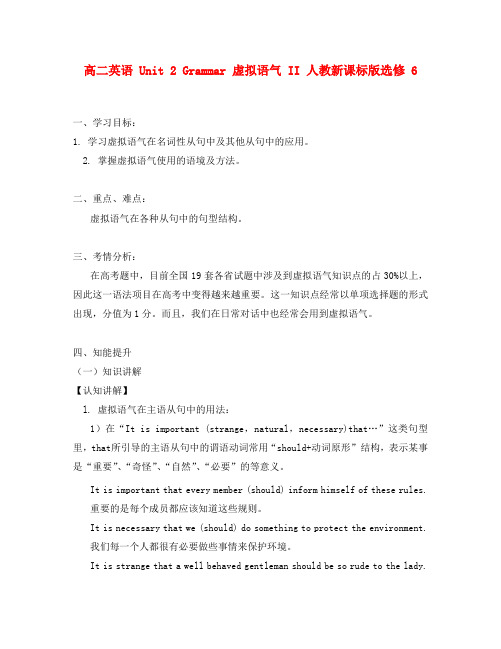
高二英语 Unit 2 Grammar 虚拟语气 II 人教新课标版选修 6一、学习目标:1. 学习虚拟语气在名词性从句中及其他从句中的应用。
2. 掌握虚拟语气使用的语境及方法。
二、重点、难点:虚拟语气在各种从句中的句型结构。
三、考情分析:在高考题中,目前全国19套各省试题中涉及到虚拟语气知识点的占30%以上,因此这一语法项目在高考中变得越来越重要。
这一知识点经常以单项选择题的形式出现,分值为1分。
而且,我们在日常对话中也经常会用到虚拟语气。
四、知能提升(一)知识讲解【认知讲解】l. 虚拟语气在主语从句中的用法:1)在“It is important (strange,natural,necessary)that…”这类句型里,that所引导的主语从句中的谓语动词常用“should+动词原形”结构,表示某事是“重要”、“奇怪”、“自然”、“必要”的等意义。
It is important that every member (should) inform himself of these rules.重要的是每个成员都应该知道这些规则。
It is necessary that we (should) do something to protect the environment.我们每一个人都很有必要做些事情来保护环境。
It is strange that a well behaved gentleman should be so rude to the lady.真奇怪,那个举止得体的绅士竟然对那位女士如此粗鲁。
2)It is ordered/suggested that…从句that引导的主语从句的谓语动词用“(should)+v.”结构。
这一类的动词还有:propose, require, demand, request, insist, ask等。
It is ordered that the cloth (should) be woven right now.命令传来,应该马上织布。
Grammar 虚拟语气
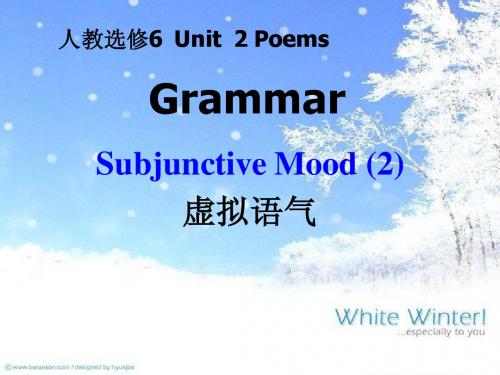
2). 虚拟语气在if only后的宾语从句中的使用 虚拟语气在 后的宾语从句中的使用
动词过去式 (were) ) had+过去分词 过去分词 would/could/might+ 动词原形
与现在事实相反 与过去事实相反 与将来 the alarm clock ___________(ring) then.
1). 虚拟语气在wish后的宾语从句中的使用 虚拟语气在 后的宾语从句中的使用
动词过去式 (were) ) had+过去分词 过去分词 would/could/might+ 动词原形
与现在事实相反 与过去事实相反 与将来 事实相反
I wish I were (be) as tall as Yao Ming.
had+过去分词 过去分词
动词原形 与将来事实 1.should+动词原形 should/ would/ could/ 2.动词过去式 might +动词原形 动词过去式 动词原形 相反 3.were to+动词原形 动词原形
Complete the list poem using Subjunctive Mood.
1.复习 虚拟语气在 条件状语从句中的用法 复习--虚拟语气在 复习 虚拟语气在if条件状语从句中的用法
条件从句 与现在 现在事实 现在 相反 与过去 过去事实 过去 相反 从句谓语形式 主句谓语形式 主句谓语形式
1.动词过去式 动词过去式(be 动 should/ would /could/ 动词过去式 动词原形 词用were,不用 不用was) might+动词原形 词用 不用 should/ would/could /might + have+过去分词 过去分词
grammar(虚拟语气)
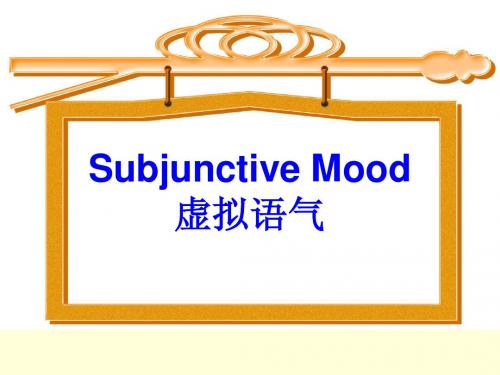
8. It’s necessary/strange/natural/ important/pity/no wonder/impossible + that---Clause 从句中的动词要用虚拟, 即 (should)+动词原形 It is important that we ( should ) master a foreign language. It is strange that she refuse to come to the party. It’s necessary that we should study hard.
将来:
Would\could\sho uld\might+v
He behaves as if he owned the house.
(But he doesn’t own it or probably doesn’t own it or we don’t know whether he owns it or not.)
一. 虚拟语气在条件状语从句中的用法。
条件 If 从句的谓语形 从句 式 主句的谓语形式 would/could/should/ might +V (原) would/could/should/ might+have+p.p.
现在
过去
V. + ed (were) had done
1.V.+ ed. would/could/should 未来 2. should+ V.(原) /might +V. (原) 3. were to do
与将来事实相反
If 从句:1.V.+ ed. 2. should+ V.(原) 3. were to do 主句:would/could/should/might +V. (原)
unit4 grammar 虚拟语气 use
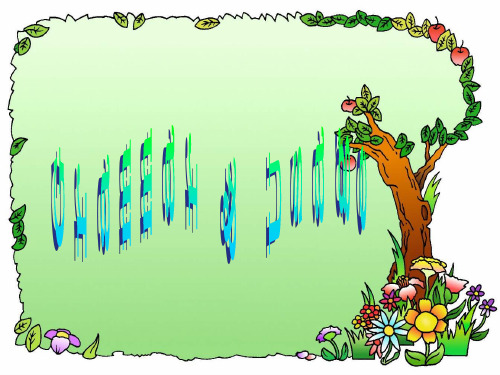
3.In adverbial clauses introduced by even if, as if, as though and if only we can use unreal conditionals.
他那样对待我,好像我是陌生人似的。 He treated me as if I were a stranger.
It’s high time that you went. 你该走了。 It’s high time that you should go. 我们该去 It’s time that we went to bed.
睡觉了。
It’s time that we should go to bed.
4.表示要求,命令,建议的虚拟语气。 1.宾语从句。常见动词: 一个坚持,两个命 令,三个建议,四个要求。即 1.insist 2. order, command
我希望和你一样高。
I wish I were as tall as you.
他希望他没讲那样的话。
He wished he hadn‘t said that.
我希望明天下雨就好了。
I wish it would rain tomorrow.
现在: did
2. would rather that
过去: had done 未来: did
ቤተ መጻሕፍቲ ባይዱ
I suggest that we (should) hold a meeting next week. He insisted that he (should ) be sent there. 注意: 如suggest, insist不表示"建议" 或"坚 持要某人做某事时",即它们用于其本意" 暗示、表明"、"坚持认为"时,宾语从句用 陈述语气。
Grammar 虚拟语气

rained/should rain/were to rain 4.If it___________________________ (rain) tomorrow,we ________________ should not go out (not go out).
Were 5.______(be) I in good health, I __________ (go) with you tomorrow. would go eg. Had you told me earlier, I could have done something. Should anyone call, tell him to call in the afternoon.
( 2 )用介词短语代替条件状语从句 用介词短语代替条件状语从句 Without air (If there were no air), there would be no living things. 如果没有空气的话,就不会有生物了。 如果没有空气的话,就不会有生物了。 But for your help(If it hadn’t been for your help)I couldn’t have done it. 要不是你的帮助,我就不可能完成这件事。 要不是你的帮助,我就不可能完成这件事。
2.表示与过去事实相反的假设或结果 eg.If you had come a few minutes earlier, you would/could/might have met the famous singer. 如果你早来几分钟的话,你就会(可能会) 见到那个著名歌唱家。 eg.if I had had the money last week, I would/could/might have bought a car. 如果我上星期有了这笔钱,我就会(可能) 买1辆车。
同步译林英语选修六新突破讲义:Unit 4 Section Ⅲ Grammar——虚拟语气(Ⅱ) Word版含答案
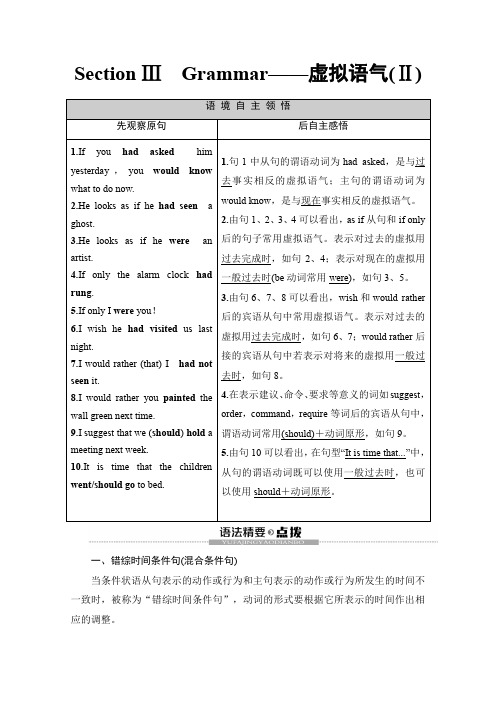
Section ⅢGrammar——虚拟语气(Ⅱ)一、错综时间条件句(混合条件句)当条件状语从句表示的动作或行为和主句表示的动作或行为所发生的时间不一致时,被称为“错综时间条件句”,动词的形式要根据它所表示的时间作出相应的调整。
If you had followed my advice just now,you would be better now.如果你刚才听了我的建议,你现在就好多了。
If he were free today,we would have sent him to Beijing.如果他今天有空的话,我们就派他去北京了。
[即时训练1]用所给词的适当形式填空①If you had studied (study)hard before,you would be (be)a college student now.②If you hadn't lost the map,we would be (be)back in the hotel now.二、含蓄虚拟条件句有时虚拟的条件不通过条件从句表达出来,而是暗含在单词、短语或上下文中,这时需要根据句中所表述的意义以及某些特定的信息词来判断此时需要采用的形式。
常用词或短语有:with,without,but for,or else,or,otherwise等。
But for her help,they couldn't have run over the mountain in such a short time.要不是她的帮助,他们不会在那么短的时间内翻过那座山。
I was ill that day.Otherwise,I would have taken part in the sports meeting.我那天病了。
否则,我就参加运动会了。
He must have been there,or he never could know the place so well.他一定去过那儿,否则他决不会如此了解那个地方。
Grammar.虚拟语气
注意 1. 在正式文体中, 有时可以把虚拟条件
句中的连词if省略, 而将were, had, should等动词提前到主语前面。 e.g. Were she younger, she would do it. 她要是再年轻点, 就会干的。
e.g. Had he known her address, he would have gone to visit her. 如果他知道她的地址, 他会去看她的。 Should it happen, what would you do? 如果真发生这样的事, 你怎么办呢?
would have gone to the zoo. had been 2. He were you, he would go home at once. Were he you/If he were you 3. I should have come here early, but I had been busy. was
虚拟语气在宾语从句中的用法 在动词: suggest, order, demand, propose, request, command, insist 等后的宾语从句中, 用虚拟语气(即 should + do或者只用动词原形do), 来表示愿望,建议,命令,请求等。
一个 两个 三个 “坚持” “命令” “要求”
2) 当从句里的时间与主句的时间是同一时间
时,从句用过去式did/ were.
e.g. He talked as if he were Napoleon.
他说话的时候就好像他是拿破伦
一 样。
3) 当从句里的时间后于主句的时间时, 从句
用would do.
e.g. He talked as if he would go to the moon.
2019-2020英语选修六讲义:Unit 4 Section Ⅲ Grammar——虚拟语气(Ⅱ) 含答案
Section Ⅲ Grammar——虚拟语气(Ⅱ)一、错综时间条件句(混合条件句)当条件状语从句表示的动作或行为和主句表示的动作或行为所发生的时间不一致时,被称为“错综时间条件句”,动词的形式要根据它所表示的时间作出相应的调整。
If you had followed my advice just now,you would be better now.如果你刚才听了我的建议,你现在就好多了。
If he were free today,we would have sent him to Beijing.如果他今天有空的话,我们就派他去北京了。
[即时训练1] 用所给词的适当形式填空①If you had studied (study)hard before,you would be (be)a college student now.②If you hadn't lost the map,we would be (be)back in the hotel now.二、含蓄虚拟条件句有时虚拟的条件不通过条件从句表达出来,而是暗含在单词、短语或上下文中,这时需要根据句中所表述的意义以及某些特定的信息词来判断此时需要采用的形式。
常用词或短语有:with,without,but for,or else,or,otherwise等。
But for her help,they couldn't have run over the mountain in such a short time.要不是她的帮助,他们不会在那么短的时间内翻过那座山。
I was ill that day.Otherwise,I would have taken part in the sports meeting.我那天病了。
否则,我就参加运动会了。
He must have been there,or he never could know the place so well.他一定去过那儿,否则他决不会如此了解那个地方。
grammar虚拟语气简介
5. Should + 动词原形表示虚拟
在 It is (was)+形容词+that 从句中要用虚拟语 气: (should+)动词原形。 常用于此类的形容词有: Important, possible, advisable, desirable, appropriate,better,crucial,essential, imperative,natural,necessary, strange, vital…
Sample Question (1) We didn't know his telephone number; otherwise we ___________him.
A) would have telephoned
C)would telephone
B)must have telephoned
D) had telephoned
Sample Question (2) Some women ___________ a good salary in a job instead of staying home,but they decided not to work for the sake of the family. A)must make C)would make B) should have made D) could have made
Sample Question
(1) Jean doesn't want to work right away because she thinks that if she ____________ a job she probably wouldn't be able to see her friends very often. A) has to get C) had got B)were to get D) could have got
高二英语 Unit 1 Grammar 虚拟语气知识精讲 新人教版选修6
高二英语Unit 1 Grammar 虚拟语气知识精讲新人教版选修6一、学习目标:1. 学习虚拟语气在条件句中的应用。
2. 掌握虚拟语气使用的语境与方法。
二、重点、难点:虚拟语气在条件句中的句型结构。
三、考情分析:在高考题中,目前全国19套各地市试题中涉与到虚拟语气知识点的占30%以上,因此这一语法项目在高考中变得越来越重要。
这一知识点经常以单项选择题的形式出现,分值为1分。
而且,我们在日常对话中也会经常用到虚拟语气。
四、知能提升〔一〕知识讲解【认知讲解】教材原句呈现①If you were an artist, what kind of pictures would you paint?②If the rules of perspective had not been discovered, no one would have been able to paint such realistic pictures.③Have you ever wished you could paint as well as a professional artist?比照分析第一个句子中的从句显然是做了一个不可能成立的假设,这是一个与现在事实相反的虚拟语气的句子。
第二个句子中如此是与过去事实相反,是表示如果透视法没有被发现,就没有人能够画出这样具有现实主义的画来。
第三个句子中wish后面的虚拟语气,表示与将来事实相反。
【重、难点】1〕虚拟语气可以用来表示说话人的主观愿望或假想,所说的是一个条件,不一定是事实,或与事实相反。
虚拟语气在条件句中应用得比拟多。
2〕条件句可分为两类,一类为真实条件句,一类为非真实条件句。
非真实条件句表示的是假设的或实际发生的可能性不大的情况,故采用虚拟语气。
I.真实条件句用于陈述语气,所假设的情况有可能发生。
结构如下所示:从句往往用一般现在时,而主句如此由“shall/will + 动词原形〞构成。
- 1、下载文档前请自行甄别文档内容的完整性,平台不提供额外的编辑、内容补充、找答案等附加服务。
- 2、"仅部分预览"的文档,不可在线预览部分如存在完整性等问题,可反馈申请退款(可完整预览的文档不适用该条件!)。
- 3、如文档侵犯您的权益,请联系客服反馈,我们会尽快为您处理(人工客服工作时间:9:00-18:30)。
我们建议Tom去休息一下。 他坚决要求我到场。 国王命令囚犯明天要实施死刑。 他们要求我们派他们去那儿工作。 We suggested that Tom have a rest. He insisted that I (should ) be present. The king ordered that the prisoners be killed the next day. They requested that we (should) send them to work there.
Байду номын сангаас
My demand is that she should come to see me once a week. All of us are for the advice that the chemical factory should be closed down.
2. It’s necessary / strange / natural / important + that---Clause 从句中的动 词要用虚拟,即(should)+ 动词原形 It is important that we (should) master a foreign language. It is strange that she refuse to come to the party.
3. If only you ____ him what I said! Everything would have been all right. A. didn't told B. hadn't told C. would not tell D. would have not told 4. He must have had an accident, or he ____________ here then. A. would have been B. had been C. should have been D. could be
虚拟语气特殊句型: 4. It’s (about/high) time + that
did
should do It’s high time that you went. It’s high time that you should go.
It’s 你该走了。 high time that you were going.
现在:did
2. would rather that 过去:had done
未来:did I would rather you paid me now.
I would rather you had gone, too. Don’t come. I would rather you came tomorrow.
did 现在;
• 3. as if\as though\even if
过去; had done
即使生了病,他也去办公室。 Even if he were ill, he would go to his office. 他那样对待我,好像我是陌生人似的。 He treated me as if I were a stranger. 她谈论那部影片,就好像她确实看过一 样。 She talked about the film as if she had really seen it.
I was busy that day. Otherwise I would have gone there with them. (If I hadn’t been busy that day, I would have gone there with them.) I would have finished the work, but I have been ill. (If I hadn’t been ill, I would have finished the work.)
It’s necessary that we should study hard.
单项选择 1. _________ cease advertising, prices would be significantly reduced. A. Were they to B. Could they C. If they D. Would they 2. Five minutes earlier, and we _______ the last bus. A. had caught B. should have caught C. could have caught D. caught
以上动词相应的名词构成的名词性从 句包括主语从句,表语从句和同位语 从句也要使用虚拟语气。从句中的动 词形式一样。 order, advice, suggestion, proposal, demand, request, desire
It’s suggested that the plan be carried out.
5. Much labour would have been saved if the electronic computers ________ before. A. had invented B. were invented C. should have been invented D. had been invented 6. I wish I ________ longer this morning, but I had to get up and come to class. A. could have slept B. slept C. might have slept D. have slept
1. The guard at gate insisted that obey everybody _____ (obey) the rules. was 2. He insisted that she _____ (be) seriously ill and that _________(send) be sent to hospitals at once. 3. He suggested that we ______ (have) a have meeting at once. 4. His pale face suggested that he was ______ (be) ill.
Unit 2 Grammar
Subjunctive Mood II
虚拟语气 1)概念 虚拟语气用来表示说话人 的主观愿望或假想,所说的是一 个条件,不一定是事实,或与事 实相反。
2)在条件句中的应用 条件句可分为两类,一类为 真实条件句,一类为非真实条件句。 非真实条件句表示的是假设的或实 际可能性不大的情况,故采用虚拟 语气。
我们该去 It’s time that we went to bed. 睡觉了。 It’s time that we should go to bed.
• 三. 从句中用sb (should) do sth 来表虚拟
1. 表示要求,命令,建议的虚拟语气。
1) 宾语从句。常见动词: 一个坚持,两个 命令,三个建议,四个要求。即 1. insist 2. order, command 3. advise, suggest, propose 4. demand, require, request, desire 这些动词后面的宾语从句要使用虚拟语气 用法。即从句中的动词使用should + 动词 原形,或者将should省略。
3) 与将来事实相反:
should (would should If 主语 …, 主语 could, might) +V原 were to
假设条件从句谓语动词发生的时间与主 句所假设的谓语动词不一致,叫做错综 条件虚拟语气。主句和从句的谓语动词 要依照假设的时间而定。
If the weather had been finer, the crops would be growing still better. If you had followed the teacher’s advice, you wouldn’t be in the hospital.
• 二. 从句中用过去式表示对现在的虚拟; 用过去完成时表示对过去的虚拟 • • 现在(将来):did\were • 过去:hand done • 特殊:wish\if only将来的虚拟用 • could\would do sth
现在: did(were)
1. wish/if only 过去: had done
I suggest that we (should) hold a meeting next week. He insisted that he (should) be sent there.
注意:如suggest, insist不表示"建议" 或"坚持要某人做某事时",即它们用 于其本意"暗示、表明"、"坚持认为" 时,宾语从句用陈述语气。
未来: would do 1) I wish I were a bird.(现在)
2) I wish I hadn’t made such a mistake. (过去) 3) We wish our parents wouldn’t punish us. (将来)
If only I knew his name! If only we had followed your advice! If only I could see him again! 要是我们的父母能和我们住在一起就 好了。 If only our parents could live with us! 要是我没错过火车就好了! If only I hadn’t missed the train!
